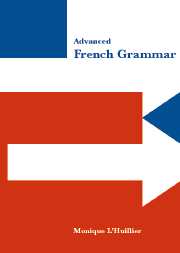Book contents
- Frontmatter
- Contents
- Acknowledgements
- Introduction
- 1 Framework
- 2 Verbs
- 4 Introduction to verbs
- 5 Present indicative
- 6 depuis and other tense markers
- 7 Future
- 8 Imperfect
- 9 Perfect
- 10 Past historic
- 11 Other past tenses
- 12 Subjunctive
- 13 Conditional and the expression of hypothesis
- 14 Imperative
- 15 Infinitive
- 16 Present participle
- 17 Past participle
- 18 Active and passive voices
- 19 Impersonal verbs and the impersonal voice
- 20 Pronominal verbs
- 21 Modals: devoir, pouvoir, vouloir
- 22 savoir and connaître
- 3 Determiners and prepositions
- 4 Nouns, pronouns and modifiers
- 5 Sentences and text
- Appendixes
- Bibliography
- Index
8 - Imperfect
Published online by Cambridge University Press: 05 June 2012
- Frontmatter
- Contents
- Acknowledgements
- Introduction
- 1 Framework
- 2 Verbs
- 4 Introduction to verbs
- 5 Present indicative
- 6 depuis and other tense markers
- 7 Future
- 8 Imperfect
- 9 Perfect
- 10 Past historic
- 11 Other past tenses
- 12 Subjunctive
- 13 Conditional and the expression of hypothesis
- 14 Imperative
- 15 Infinitive
- 16 Present participle
- 17 Past participle
- 18 Active and passive voices
- 19 Impersonal verbs and the impersonal voice
- 20 Pronominal verbs
- 21 Modals: devoir, pouvoir, vouloir
- 22 savoir and connaître
- 3 Determiners and prepositions
- 4 Nouns, pronouns and modifiers
- 5 Sentences and text
- Appendixes
- Bibliography
- Index
Summary
Rien n'est imparfait sauf le subjonctif
Introduction
The imperfect (imparfait) puts the process expressed by the verb in the past. Like the present, the imperfect expresses the non-accomplished aspect, hence its other name: présent du passé. In the discourse situation, the imperfect expresses the non-accomplished aspect by opposition to the perfect (passé composée), which expresses the accomplished aspect. In historical texts, it is opposed in the same way to the past historic (passé simple).
The imperfect in French thus expresses continuation or repetition in the past. Hence it is often used to describe situations or habits. However, there are cases where:
– both English and French express continuation or repetition with another past tense (simple past and perfect). This reflects a difference of aspect:the action or situation is seen from the present rather than from the past.
– English can describe situations and habits in the simple past, whilst French uses the imperfect.
The imperfect in French can also be used instead of a perfect or past historic for stylistic effect (narrative imperfect).
Finally, besides these temporal and aspectual values, the imperfect also has modal values.
The imperfect in subordinate clauses is treated in chapters 6 depuis and Other Tense Markers and 41 Reported Speech, section 3.10.
Formation
The imperfect tense is formed with a radical of the main verb (i.e. the 1st person plural of the present indicative which is invariable) + the appropriate imperfect ending as shown below.
- Type
- Chapter
- Information
- Advanced French Grammar , pp. 115 - 125Publisher: Cambridge University PressPrint publication year: 1999



